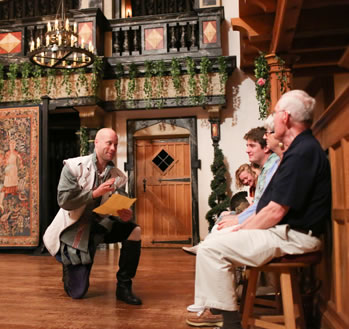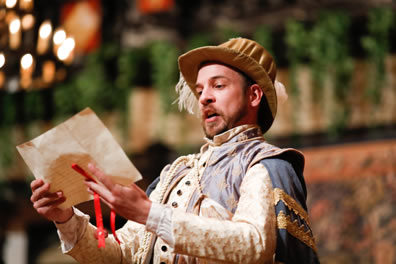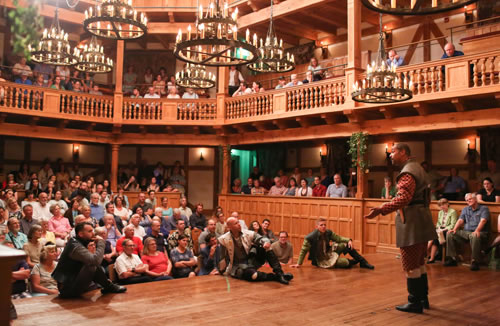Love’s Labour’s Lost
When Love Speaks
American Shakespeare Center, Blackfriars Playhouse, Staunton, Virginia
Friday, September 22, 2017, C–6&7 (center stalls)
Directed by Matthew Radford Davies
 King Ferdinand of Navarre (Greg Brostrom) tries out the love poem he has written to the Princess of France for members of the audience using the gallant stools on the Blackfriars Playhouse stage during the American Shakespeare Center's production of William Shakespeare's Love's Labour's Lost. Photo by Lindsey Walters, American Shakespeare Center.
King Ferdinand of Navarre (Greg Brostrom) tries out the love poem he has written to the Princess of France for members of the audience using the gallant stools on the Blackfriars Playhouse stage during the American Shakespeare Center's production of William Shakespeare's Love's Labour's Lost. Photo by Lindsey Walters, American Shakespeare Center. Luciano Pavarotti singing Pagliacci. Bettye LaVette singing Love Reign O'er Me. Itzhak Perlman playing Tchaikovsky's Violin Concerto. B.B. King playing "How Blue Can You Get?" René Thornton Jr. playing Berowne. When great artistic skill meets great works of art, heaven reveals itself. By the time the American Shakespeare Center’s production of William Shakespeare's Love’s Labour’s Lost at the Blackfriars Playhouse gets to Berowne’s “Have at you then, affection's men at arms,” I put pen and notebook down and ready myself to revel in the moment, like settling into a beach chair for a glorious sunrise.
Love’s Labour’s Lost is the ultimate Shakespeare snob play. It features some of the canon’s most flowery verses and a plot centered on witty repartee among a cast of gender-pairing royal courtiers juxtaposed with a half-dozen country folk and one bizarre, language-addicted, romantic Spaniard. The obtuse nature of its comic verses means the play is infrequently staged compared to Shakespeare's other romantic comedies, and many productions gut it and dress the play in borrowed art, from jazz to boy band pop. The American Shakespeare Center (ASC), however, approaches Love's Labour's Lost head-on, not only embracing its language, personage, and period (glorious Elizabethan costumes by Victoria Depew) but using all three to construct genuinely Shakespearean gut-busting entertainment that inspires multigenerational laughs (as young as 6ish) from all comers to the playhouse.
The play's snob pedigree may have originated with Shakespeare himself. It has no known source for what passes as its plot and might have been originally written for private performance at a lord’s manor (internal evidence includes the intellectual nature of the jokes and the number of prominent young female roles, as women took part in private performances for nobility). Nevertheless, while he might have been writing a play for snobs, Shakespeare most definitely wrote a comedy about snobs.
This ASC production reveals the complexly flowery verse to be mere cover for simply ridiculous people. There's Ferdinand, the King of Navarre (Greg Brostrom), who turns his court into an academy, decreeing that not just the three courtiers, Berowne, Longeville (Benjamin Reed), and Dumaine (Josh Innerst), but also other guests and staff must follow strict rules of fasting, waking, and no interaction with women. There's the Princess of France (Shunté Lofton), who visits Navarre on a diplomatic mission with three ladies-in-waiting, Rosaline (Allie Babich), Maria (Lauren Ballard), and Katherine (Allison Glenzer), and an attending lord, Boyet (Tim Sailer). The men, in violation of their oaths, set to seducing the ladies; the women resort to mocking the gentlemen (men deserve it, they reason). There is Don Armado (Chris Johnston), a Spanish knight with a crush on the "base" country maid Jaquenetta (Glenzer) and an even greater lust for language and his own passionate persona. There's Don Armado's witty-beyond-his-years page, Moth (Christopher Seiler), and there is the überlearned-and-knows-it schoolmaster Holofernes (Innerst) and his fawning parish priest Nathaniel (Babich).
Snobs all. Even the "country swain" Costard (David Anthony Lewis) displays an air of ironic superiority when he and Jaquenetta are dismissed so the King and his courtiers can address their collective oath-breaking bents. “Walk aside the true folk, and let the traitors stay,” Costard says (emphasis in Lewis’s delivery).
Only Dull the Constable (Sailer) escapes the infection of arrogance, though he stubbornly insists that the deer Holofernes describes as a “haud credo” was a pricket and not an "aud gray doe." Over the course of another scene, he remains silent as Don Armado enlists Holofernes to come up with some entertainment for the King and Princess, and Holofernes decides to do the Nine Worthies with himself playing three or four. “Via, goodman Dull! Thou has spoken no word all this while,” Holofernes says at scene's end. Replies Dull: “Nor understood none neither, sir.” Shakespeare is holding a mirror up to his own play—and I hear him chuckling.
This play's true essence emerges in the hands of ASC actors well trained in Shakespeare’s verse and steeped in his production practices at the Blackfriars, the world's only re-creation of Shakespeare's indoor theater. At the helm is Matthew Radford Davies, a veteran actor and director on both sides of the Atlantic and currently associate professor of acting and directing in Mary Baldwin University's Shakespeare and Performance graduate program. In Shakespeare's "play full of words, his characters live for wordplay," Davies writes in his program notes. "They measure themselves and engage each other through quips, quibbles, and put-downs, employing the kind of verbal pyrotechnics for which the skilled ASC actors and the acoustically resonant Blackfriars Playhouse are ideally suited."
Indeed, when you listen to Berowne tattle on in allegorically layered verses, the jokes emerge both through Shakespeare's juxtaposition of the words in iambic pentameter line structures and through Thornton's interpretation of Berowne as a divided wit at war with itself when he realizes that it is he among the courtiers who has fallen in love:
What, I! I love! I sue! I seek a wife!
A woman, that is like a German clock,
Still a-repairing, ever out of frame,
And never going aright, being a watch,
But being watch'd that it may still go right!
Nay, to be perjured, which is worst of all;
And, among three, to love the worst of all;
A wightly wanton with a velvet brow,
With two pitch-balls stuck in her face for eyes;
Ay, and by heaven, one that will do the deed
Though Argus were her eunuch and her guard:
And I to sigh for her! to watch for her!
To pray for her! Go to; it is a plague
That Cupid will impose for my neglect
Of his almighty dreadful little might.
What Davies and his cast also reveal in all of this intelligent word play (and not so intelligent, in the case of Don Armado) is that all of these characters (except perhaps Dull), aspiring to ethereal levels of sophistication (except perhaps Costard), really have only one thing on their minds: sex, including Holofernes's pontifications unwittingly revealing his randy behavior with the community's young women. As Berowne says, "But love, first learned in a lady's eyes, lives not alone immured in the brain; but, with the motion of all elements, courses as swift as thought in every power, and gives to every power a double power, above their functions and their offices." Oh my! Or, as Costard says, "Such is the simplicity of man to hearken after the flesh." Yup. Or, as Moth sings for Don Armado, "Will he? Will he? Will he?" with accelerating fervor until the Spaniard cuts him off. Did he really sing that?
Davies further builds his production on visual gags that are textual in nature—but not, I'm quick to point out, subtextual: no rude gestures and the like (except maybe Moth in the Nine Worthies playing Hercules as a baby strangling a snake). Rather, the jokes are as much character driven as linguistically borne. The lords disguised as Muscovites approach the French ladies claiming to have "measured many a mile to tread a measure with you on this grass." The women are aware of the lords' ploy and so mask themselves and switch identities. Rosaline, pretending to be the Princess, demands to know of the Muscovites how many inches are in a mile: "If they have measured many, the measure then of one is easily told." The women titter at this sexual jest, but after some confusion over her meaning, Berowne replies that they "measure them by weary steps." Reed's Longaville, though, a few lines later suddenly shouts out a mathematical answer to Rosaline's question and is quickly shushed by his fellows. Longaville's eruption is not in Shakespeare's text, but it is just so Longeville as Reed has portrayed him from the start.
Like Pyramus and Thisbe in A Midsummer Night's Dream and the interrogation of Paroles by gibberish-speaking enemy soldiers in All's Well That Ends Well, the Muscovite invasion gives directors plenty of leeway to use as much visual (and aural) slapstick as they want. In this staging, Davies calls on the company's inherent musical skills to have the lords entertain the ladies with a traditional Cossack dance—except, these lords aren't good at it. The hilarious choreography by Stephanie Holladay Earl entails the lords pairing up so that one can support a fellow doing the squatting kicks. I'm not sure it entertains the ladies, but it certainly entertains the theater audience, and it plays to how obviously stupid the Muscovite episode is in the first place. We never hear this idea hatched, only that Boyet overhears the lords preparing to put it in practice. Later, when the ladies reveal that they knew the lords were the Muscovites, the men's body language reveals the idea to be Dumaine's. Again, not textual, but just so Dumaine as Innerst plays him.

Boyet (Tim Sailer) reads Don Armado's letter to the Princess and her train in the American Shakespeare Center's production of William Shakespeare's Love's Labour's Lost. Below, Berowne (René Thornton Jr.) delivers his "affection's men at arms" speech to, at the front of the stage from left, Dumaine (Josh Innerst), Ferdinand (Greg Brostrom), Longaville (Benjamin Reed), and the rest of the Blackfriars Playhouse's rapt audience. Photos by Lindsey Walters, American Shakespeare Center.
Davies and company not only follow Shakespeare's lead in building individual characters but in building jokes, too. The fantastical Don Armado—and Johnston plays him fantastically fantastical; you've never seen a man lie down with such affectation—has two of his funniest moments when he's not even on stage, courtesy of two letters he's written. The first, the king reads aloud to the lords in the opening scene (before we even meet Don Armado). The second letter is Don Armado's love ode to Jacquenetta, which Costard mixes up with Berowne's love ode to Rosaline and wrongly delivers to the Princess's party; Boyet reads this one aloud to the ladies. Both Brostrom and Sailer deliver the verbose constructions of these letters to maximum comic effect, and in the latter case the women, along with an accompanying Forester (David F. Meldman), play along, trying to anticipate the next word or phrase. Whether they get it right or wrong highlights the letter writer's convoluted logic.
Love's Labour's Lost is an ensemble piece. Any number of characters are capable of carrying the show, and with this company, the entire ensemble carries the show, every actor in every part giving memorable performances. Key doubling includes Innerst as Dumaine and an incessantly pompous Holofernes, and Babich as Rosaline and Nathaniel, Holofernes's intellectual groupie. These doublings require some sleight-of-hand in the final scene as the lords and ladies watch the Nine Worthies. Rosaline/Dumaine delivers a line, and as the audience's attention turns to whoever is responding, Babich/Innerst slips behind the Nine Worthies' curtain to change costumes (from Elizabethan grandeur to silly matter, such as Babich's Nathanial playing Alexander using an oval bucket with leeks sticking out as his helmet).
Thornton gives a virtuosic performance as Berowne. Over the 13 years we have been watching this actor on the Blackfriars stage, he has always been a studious practitioner of Shakespeare's verse while his abilities in developing characters has matured. The combination has resulted in richly nuanced and dramatically deep portrayals across the canon. Berowne is something of Thornton's coup de théâtre, for he has taken this, the most poetic of Shakespeare's leads, and created an engagingly comic character. "Have at you then, affection's men at arms," is his aria, a sensuous legal writ for romantic love. "And when Love speaks," he says, pausing briefly to hear Love speaking in his own head and smiling brighter, "the voice of all the gods makes heaven drowsy with the harmony." Good God!
Ah, but this speech is really a "salve for perjury." With a lawyer's logic-bending calisthenics, Berowne is offering the king and his fellow courtiers an argument for breaking their sworn (and signed) academy oaths. The French ladies, who have been forced to camp in a field outside the court of Navarre, throw these broken oaths back in their faces. It's all in the name of rom-com hijinks, for as the Nine Worthies pageant begins, Ferdinand worries that "they will shame us." "We are shame-proof, my lord," Berowne replies, "and 'tis some policy to have one show worse than the king's and his company." Indeed, the Nine Worthies make the Muscovites look Broadway-bound.
 Shakespeare, however, in this final scene lowers the boom on all egos, broken oaths, and lust-over-love reasoning. First, the rustic braggarts Holofernes and Nathaniel, as well as Don Armado, get their comeuppance with the ruthless mockeries of the lords and ladies watching their play. Then, just as the hijinks reach a chaotic climax, Marcadé (Meldman), dressed in black, enters with his message from the French court. "Thou interrupt'st our merriment" the Princess gently scolds him, whereupon Shakespeare turns the play upside down. When done right, it breaks the heart, and it’s done exactly right here, as Meldman's Marcadé cuts through the rambunctious joviality with curtness to the Princess, who suddenly realizes the purport of his message and finishes it for him: her father, the king of France, is dead. “Even so: My tale is told,” Mercadé says, and bows low. Realization passes sequentially through the company: the ladies and Boyet immediately kneel to the Princess, and Navarre and Berowne bow, as do Longeville and Dumaine and Don Armado; Costard, watching the others, uncomfortably does a half bow, trying to get the bow right more than understanding what’s going on. “Worthies away! The scene begins to cloud,” Thornton's Berowne says in low voice as the Princess, holding back tears, prepares to depart.
Shakespeare, however, in this final scene lowers the boom on all egos, broken oaths, and lust-over-love reasoning. First, the rustic braggarts Holofernes and Nathaniel, as well as Don Armado, get their comeuppance with the ruthless mockeries of the lords and ladies watching their play. Then, just as the hijinks reach a chaotic climax, Marcadé (Meldman), dressed in black, enters with his message from the French court. "Thou interrupt'st our merriment" the Princess gently scolds him, whereupon Shakespeare turns the play upside down. When done right, it breaks the heart, and it’s done exactly right here, as Meldman's Marcadé cuts through the rambunctious joviality with curtness to the Princess, who suddenly realizes the purport of his message and finishes it for him: her father, the king of France, is dead. “Even so: My tale is told,” Mercadé says, and bows low. Realization passes sequentially through the company: the ladies and Boyet immediately kneel to the Princess, and Navarre and Berowne bow, as do Longeville and Dumaine and Don Armado; Costard, watching the others, uncomfortably does a half bow, trying to get the bow right more than understanding what’s going on. “Worthies away! The scene begins to cloud,” Thornton's Berowne says in low voice as the Princess, holding back tears, prepares to depart.
The rest of the play is delivered seriously as Ferdinand tries to forestall the Princess, and then presses his love suit, for himself and the rest. The women never considered those suits seriously, and now they do, demanding that the men prove they are serious by living as hermits for a year (Rosaline goes further with the cynical Berowne, charging him with telling jokes to hospital patients on death's door). Even Don Armado exchanges lust that he calls love (having gotten Jaquenetta pregnant) for true devotion. This is as happy an ending as Shakespeare allows, but, as Berowne notes wryly, the play does not end as a comedy. "Come, sir, it wants a twelvemonths and a day, and then 'twill end," Ferdinand says. "That's too long for a play," Berowne replies.
The rustics are allowed to perform their play's closing song, "The Owl and the Cuckoo," and they accompany the cuckoo verses with a simple peasant's dance. When they move into the verses for the owl, the Princess and her train suddenly step forward to form a line. The gentlemen respond opposite them, and the royal parties do a formal waltz. I get shivers just writing this in recollection.
"The words of Mercury are harsh after the songs of Apollo," Don Armado says, speaking the play's closing line. "You that way" he points one way for France's ladies: "We this way," he points toward the opposite door for Navarre's gentlemen. As they all start to depart, a cuckoo sounds. The cast stops, turns back, and looks out over the audience. Twelvemonth and a day may be too long for a play, but it's not too long for what this play says. When Love speaks, "the voice of all the gods," it goes on, beyond this stage, beyond this time. It's a humbling thing.
Eric Minton
September 29, 2017
Comment: e-mail editorial@shakespeareances.com
Start a discussion in the Bardroom



 Find additional Shakespeareances
Find additional Shakespeareances